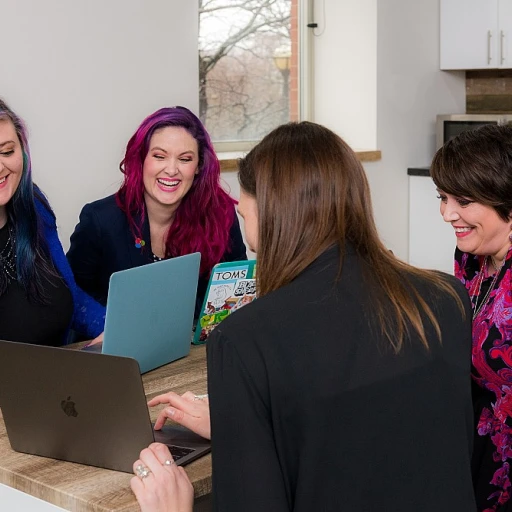Understanding the Importance of Diversity in the Workplace
The Role of Diversity and Inclusion in Business Success
The importance of diversity in the workplace can't be overstated. It's not just a buzzword floating around in HR departments; it's a business imperative that touches every corner of an organization. Companies aren't just checking boxes when they incorporate diversity into their workplace. It's about creating a team that's motivated by different perspectives. Diversity spurs innovation, boosts creativity, and strengthens decision making. After all, hiving different viewpoints helps address complex challenges more effectively.
Enhancing Equity and Inclusivity
Inclusion is the glue that holds a diverse workforce together. It's great to have a variety of people from different backgrounds—be they cultural, educational, or experiential—but without inclusion, those differences can become barriers rather than strengths. Equity plays a vital role here, ensuring that everyone has access to the same opportunities, and being treated fairly, which fosters a fair and unbiased workplace. This enhances team dynamics, encouraging employees to contribute actively without the fear of unconscious bias or exclusion.
DEI Initiatives and Their Impact
Enter Diversity, Equity, and Inclusion (DEI) initiatives. Businesses are setting programs that foster these principles. DEI isn't a one-off project; it's a continuous effort to be ingrained into the company culture. It includes ongoing training, revising policies to root out biases, and implementing practices that promote fairness and appreciation of differences.
HR professionals must understand this evolving view of diversity in the workplace to make meaningful inclusion efforts. So, when you're interviewing for an HR job, the focus will be to demonstrate your understanding of these principles—their impact, benefits, and the ways you can contribute to maintaining a healthy work environment.
Company Commitment to Diversity
Seizing upon a company's commitment to DEI can be an important conversation in any HR interview. HR interview questions often touch on how a candidate perceives diversity and inclusion and how they plan to foster these values. A good answer may draw on your personal experiences or industry-specific insights. How will you champion diversity? Have you ever been part of a team where inclusivity brought out the best ideas? Share those experiences to reflect your understanding and commitment.
Stay tuned for more insights on crafting your responses in this mastering HR interviews guide, as we delve into the common questions asked and how best to prepare yourself for success.
Common HR Interview Questions on Diversity
Spotlight on Diversity Questions in HR Interviews
In the world of HR interviews, diversity questions are becoming a staple. Companies are keen to understand how potential employees perceive and contribute to an inclusive work environment. These questions are not just about ticking boxes but about finding candidates who genuinely value diversity and inclusion.
Common Questions You Might Encounter
When you're sitting across from a hiring manager, you might face questions that dig into your experiences and beliefs about diversity. Here are some examples:
- How do you define diversity and inclusion? This question gauges your understanding of the concepts. A good answer might include a personal story that highlights your commitment to these values.
- Can you give an example of how you've worked with diverse teams? Here, the interviewer is looking for real-life experiences that demonstrate your ability to collaborate with people from different backgrounds.
- How would you handle a situation where a team member was being excluded? This question tests your problem-solving skills and empathy. A strong response shows you can address issues of equity and inclusion effectively.
Why These Questions Matter
HR professionals are not just looking for the right answer; they want to see your values in action. Your responses can reveal your level of awareness about unconscious bias and your willingness to learn and grow in a diverse workplace. They also help the company assess how you might contribute to their ongoing inclusion efforts.
For more insights on mastering these skills, check out our guide on mastering essential skills for HR interviews.
Preparing for These Questions
Preparation is key. Reflect on your past experiences and think about how they relate to diversity and inclusion. Practice your responses, but keep them genuine. Remember, authenticity goes a long way in making a positive impression.
By understanding the common questions and preparing thoughtful responses, you can confidently approach your HR interview and demonstrate your commitment to a diverse and inclusive workplace.
Crafting Your Responses: Tips and Strategies
Preparing Your Diversity Response: Keys to Success
Responding to diversity interview questions can feel a bit tricky, but with the right approach, you'll impress your interviewer with thoughtful answers. To start, it's crucial to understand that companies value diversity for more than just ticking a box. It's about fostering an inclusive workplace where everyone feels valued and heard. Your answer should reflect an appreciation for diversity, equity, and inclusion (DEI) efforts at your current or previous workplace. Consider mentioning specific initiatives where you've seen or contributed to successful DEI outcomes. Think about times when working with a diverse team improved your ability or your team’s ability to problem solve or make decisions.Showcase Your Personal Experience
Tap into your personal experiences with diversity and inclusion. Have you ever worked in a team with members from various backgrounds? What did you learn from those interactions? Real-life examples where you've witnessed or participated in an inclusive work environment can illustrate your commitment. For instance, share an instance where diverse perspectives led to unexpected solutions or enriched the project outcome.Balancing Personal and Company Values
Align your response with the company's values. Research getting ready for HR job interviews to grasp what they're looking for in their hiring process. Many companies highlight DEI in their mission statement, so referencing specific language from their website or job description can really drive home your point and show you're invested in their culture.Emphasize Awareness and Mitigating Unconscious Bias
Importantly, be ready to discuss how you combat unconscious bias in the workplace. Talk about your proactive steps in educating yourself and others about bias and how to create an inclusive atmosphere. Remember, an inclusive workplace isn't just built by policies, but through daily actions of empathy and respect towards underrepresented groups. A good answer may encompass your awareness of equity inclusion challenges and your intention to support such initiatives. Practice your response, maybe with a friend or in a mock interview scenario. This will not only refine your approach but also boost your confidence for the actual interview. For more tips on crafting effective responses, visit mastering HR interview responses for success.What HR Professionals Look for in Diversity Responses
What HR Looks for in Your Diversity Responses
When it comes to diversity and inclusion questions in HR interviews, hiring managers are not just looking for buzzwords. They want to see genuine understanding and commitment. So, what exactly are they hoping to hear?
First, authenticity is key. Managers can tell when you're giving a rehearsed answer versus speaking from personal experience. Sharing a real-life story about how you've contributed to a diverse workplace or learned from an inclusive team environment can set you apart. It's not just about what you've read or heard; it's about what you've lived.
Next, they’re interested in your awareness of unconscious bias and how it can impact decision-making. Acknowledging that everyone has biases and discussing steps you've taken to minimize them in your work environment shows maturity and insight. For example, you might mention a time when you noticed a bias in a hiring process and suggested changes to make it more equitable.
HR professionals are also on the lookout for your understanding of equity and inclusion as ongoing efforts. It's not just about hiring diverse employees but ensuring that all team members feel valued and have equal opportunities for growth. You might discuss how you've supported underrepresented groups in previous roles or advocated for inclusive policies within your organization.
Finally, they're assessing your ability to contribute to a positive, inclusive work culture. This means being proactive in fostering an environment where everyone feels they belong. Whether it’s organizing team-building activities that celebrate diverse cultures or leading discussions on DEI topics, your actions speak volumes.
Remember, it’s not just about ticking boxes. HR professionals want to see that you genuinely value diversity and inclusion, and that you’re committed to making a positive impact in your next role. For more insights on crafting strong responses, refer to the earlier sections of this article.
Examples of Strong Diversity Responses
Standout Examples with a Personal Touch
Creating stellar responses to diversity interview questions involves marrying authenticity with insight. For instance, consider a situation where you worked alongside a diverse team in an inclusive environment, fostering equity across various roles. By explaining how diversity and inclusion became integral parts of your daily tasks or team dynamics, you provide a relatable narrative. Imagine sharing a story about collaborating with underrepresented groups within your company. Talk about how you tackled challenges and embraced diverse perspectives in decision making. Did you witness any positive changes in your work environment because of your actions? Highlight how promoting equity and inclusion not only benefited your team but also boosted overall morale and productivity."In my previous role as a manager at a mid-sized company, we noticed that our hiring pool lacked diversity. We took conscious steps to change this—starting with our job descriptions. We collaborated with HR to ensure clarity and inclusiveness. As our team became more diverse, our ideas expanded, strategies became more effective, and our company culture thrived. This shift was fueled by a genuine commitment to diversity equity and inclusion."
Just like that example, think of experiences that illustrate your understanding of diversity and inclusion aspects. Discuss how you've led or participated in notable diversity inclusion efforts, such as mentoring programs or DEI initiatives. A good answer often seamlessly weaves personal experiences with broader insights about diverse workplaces. Remember, HR professionals seek more than just words; they value genuine commitment and proactive involvement. So when faced with those crucial inclusion interview questions, lean in with sincerity and let your story be heard.Preparing for Diversity Questions: Resources and Practice
Get Ready for Diversity Questions with Effective Practice
It's always a good idea to walk into an interview with your best foot forward, especially when diversity, equity, and inclusion (DEI) topics come up. To make sure you're prepared, let's explore some simple strategies to practice and improve your answers. A heads-up: interviewers often dig into how you’ve embraced diversity in previous roles and how you’ll bring that experience into their workplace.
Start with Self-Reflection
Begin by thinking about your own values and experiences around inclusion and diversity. Reflect on past work experiences where you interacted with diverse teams. This can help you identify authentic stories to share when those questions pop up. Remember, it's important to discuss both your personal and professional growth on this topic.
Use Mock Interviews
Try role-playing with a friend or mentor. This practice can be invaluable. Ask them to throw some curveball questions your way, similar to those you might face from a hiring manager. By simulating real DEI interview questions, you can iron out any wrinkles and build confidence over time.
Leverage Online Resources
There's a treasure chest of resources out there designed to help you understand DEI concepts in depth. Websites, podcasts, and books offer diverse (pun intended) perspectives. Engage with these materials to gather insights and different viewpoints which might just be the ace up your sleeve during the interview.
Stay Updated on Current Trends
Keep an eye on news about DEI in the workplace. Whether it's technological innovations evolving work environments or trends in equity inclusion, staying informed not only broadens your understanding but also gives you a leg up in articulating how you'd contribute to a more inclusive company environment.
Understand Different Cultures and Perspectives
Actively making an effort to learn about cultures and perspectives different from your own broadens your horizons. This includes recognizing unconscious biases and participation in inclusion efforts challenging underrepresented groups. Showing that you value diverse voices and inclusive workplaces in your answers signifies your proactive approach.
Practice Makes Perfect
The path to mastering questions on equity inclusion isn't necessarily a hard one. With consistent practice, you can not only formulate strong responses but also genuinely echo the values cherished by progressive organizations. After all, interviews are a two-way street; while they assess your potential as a fit, you’re equally gauging how they stand by their commitment to DEI.
Don't forget to keep honing your skills with regular practice. The workplace is ever-evolving and keeping yourself prepared will put you in good stead for any interview question thrown your way.








